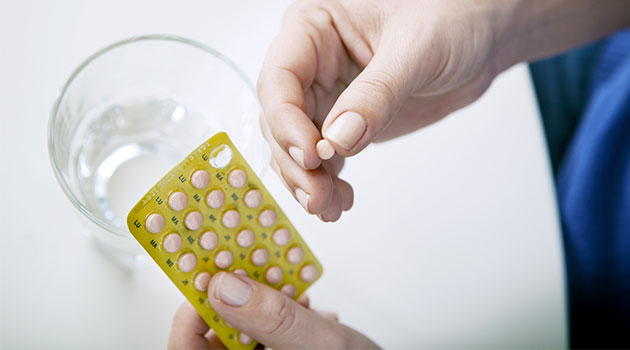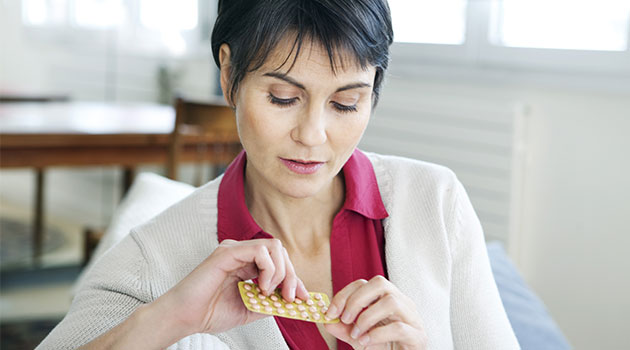Do you live abroad and long for home ?
Recommendations for eye make up remover


For some women going through menopause, hormone replacement therapy (HRT) can be a godsend, but some GPs are hesitant to prescribe it to women over 60, even though they may still be suffering from menopause symptoms. If you're struggling to decide whether it's right for you, here's our guide to starting HRT at 60, including the benefits, risks and, if you decide against it, effective alternatives that you can try.
Get advice and support on our menopause forum...
HRT is a common abbreviation for hormone replacement therapy. In short, it is a man-made replacement for the hormones your body stops producing once you hit menopause (progesterone and oestrogen). Taking HRT helps to restore these hormone levels and, as a result, can help to relieve menopausal symptoms, particularly the hot flushes that so many women struggle with.
Common symptoms of menopause include:
Some of these symptoms may have begun while you were still having periods such as during the perimenopause. You might find that you experience different symptoms with each stage of the menopause and with differents degrees of severity. Evidence has suggested that there are a few things that can help ease the severity of those that you do experience, such as altering your diet and exercising regularly. Sometimes, however, it's not as easy as that, and when these measures fail, you may want to consider hormone replacement therapy.

Hormone replacement therapy comes in various forms, including tablets, patches, gels and creams. The effects of HRT vary from woman to woman - what is right for you will depend on the symptoms you are experiencing and should be discussed with your doctor.
HRT tablets are the most common form, with HRT patches following a close second. Both of these options are available in oestrogen-only and combined (oestrogen and progesterone) forms, and the patches are replaced every few days, while the tablets are taken every day.
Oestrogen is also available as a gel which is applied daily to the skin. Oestrogen pessaries that are placed in the vagina can help reduce local dryness, but do not tackle more general symptoms. Here's an overview of the different types of hormone replacement therapy, including the benefits, risks and side effects of each:
| Types of HRT | Pros | Cons |
|---|---|---|
| Tablets (oestrogen-only) | - Prevention of osteoporosis - Helps with all menopausal symptoms, including hot flushes and sweats |
- Used alone (without progesterone) raises the risk of endometrial cancer - Slightly raised risk of blood clots - Not suitable for those with liver problems - Slightly raised risk of breast cancer |
| Tablets (combined) | - As above - The combination of oestrogen and progesterone means that endometrial cancer risk is not raised |
- Higher risk of breast cancer compared to oestrogen-only - Slightly raised risk of blood clots - Slightly increased risk of stroke and heart attack |
| Patches | - Helps with menopause symptoms and can prevent osteoporosis. - Hormone is absorbed directly into the blood stream, and does not go through the liver. This means there is no increased risk of blood clots (as many of the factors involved in blood clotting are made in the liver) - Gives a constant steady dose of the hormone. This can mean that some women have fewer side effects |
- Can cause some skin irritation, and some women are allergic to them |
| Oestrogen gel | - As with other forms of HRT, it offers relief from menopausal symptoms and can help with osteoporosis - Like patches, the hormone is absorbed through the skin, so does not affect the liver - Possible to ‘micro-manage’ the dose |
- Not enough studies to prove that this form of oestrogen doesn't slightly raise the risk of blood clots, stroke, breast cancer etc. |
While HRT can be beneficial to menopausal women, there are risks with each type of medication. If you're considering it, speak to your GP who will advise you on the best type for you.
Most women hit menopause between the ages of 45 and 55 with the average age being 51. However, symptoms can last up to 12 years after you reach menopause. It's also worth keeping in mind that not everyone opts for hormone replacement therapy and it may not be suitable for some, including those with a history of breast and ovarian cancer in the family.
If you find that your GP won't prescribe it to you, but you feel you would like a second opinion on the potential benefits of HRT after 60, it could be worth going to a doctor who specialises in the menopause.
Join over 250,000 users on Gransnet today
"I am aware of the risk factors, but I value my current quality of life. If day-to-day living is intolerable, then for me the risks are worth it."

As with most medication, HRT carries its own risks and side effects, both short-term and long-term. After a study in 2002 found that it was linked to increased risk of breast cancer, the number of women taking the drug plummeted. NICE (The National Institute for Health and Care Excellence) guidelines released in 2015, however, suggested that better information about the risks and benefits of HRT over 60 could help many of the women, who have ruled out taking the drug for fear of the risks, come to a more balanced decision about treatment. The NHS advises that generally the benefits of taking hormone replacement therapy outweigh the risks.
A study by University of Nottingham researchers found that a small number of people taking certain types of HRT tablets could be more at risk from blood clots. While the overall risk is low, the study concluded that HRT gels and patches were the safest to use.
A recent study suggested that there was a small increased risk of developing Alzheimer's disease with long-term use of HRT, particularly for those who use HRT for over 10 years. However, medical professionals have stated that women shouldn't be too concerned about the results of the study, as the risk is small and it was an observational study not accounting for other factors.
In cases where a woman is taking combined HRT (as opposed to oestrogen-only HRT, which carries a smaller risk), her chances of developing breast cancer are doubled. However, statistics also show that breast cancer risks return to normal within five years of coming off the medication.
There is no evidence that bio-identical hormones are any safer than standard HRT. We spoke to Dr. Marilyn Glenville PhD, the UK's leading nutritionist specialising in women's health:
"Research suggests that it is not appropriate for women over the age of 60 to start HRT because the risks are higher. Bio-identical hormones are chemically similar in structure to the hormones your body would produce naturally, but they carry the same risks as conventional HRT and they are not licensed by the UK regulatory authorities. The bio-identical hormones are still made in a lab in the same way that the conventional medication would be made and from the same sources. The big question is when would you stop taking them? If it is correct to replace those naturally declining hormones then you would need to take them forever."
These risks are best discussed with your doctor, who can help you make an informed decision. You can find more, specifically regarding cancer risks, on the Cancer Research website.
The benefits of HRT are generally thought to outweigh the risks in women under 60, or when used within 10 years of the beginning of menopause. But what about after 60?
As women reach this age, it's fairly common for GPs to start suggesting they stop or gradually reduce their dosage. Gransnetters themselves mostly recommend reducing the dosage slowly to minimise the possible negative effects of symptoms making themselves known again.
"I am convinced that very gradually coming off HRT was the way to do it. The whole process took over a year but, apart from some hot flushes for the first six months, I am now more or less symptom-free."

If your GP has advised against taking HRT or you don't want to run the associated risks, there are many alternative therapies to consider.
Make sure you get regular exercise, including strength training, cardio or even yoga, Pilates or tai chi.
You can do this with food. Chickpeas, beans, soya milk and soya beans all contain phytoestrogens which work to raise levels that have taken a dive due to menopause.
This medicinal plant has long been hailed as helpful in reducing night sweats and hot flushes. However, it's important to note here that no studies have proven that it is either safe or effective. Safety concerns, including potential liver risks raise questions about its reliability. Current NICE guidelines warn that Black cohosh has a known potential risk of liver damage while a recent Gov.UK MHRA report says: “Worldwide, the liver reactions reported vary from abnormal liver-function tests and jaundice to liver failure. Just over half of the reactions reported resulted in admission to hospital. The limited evidence available suggests that the reactions occurred within three months of starting black cohosh.”
This supplement is proven to help with mood regulation, so could potentially be very helpful for those who suffer from depression during menopause. Do talk to your doctor before taking it though, as it is known to interfere with certain medications.
There is evidence that antidepressants, which alter serotonin levels in the brain, can also help with body temperature regulation. They can help to ease hot flushes and sweats, and can be also help to ease the mood changes that some women experience at the time of the change.
The LadyCare magnet is a device that claims to ease menopause symptoms naturally. According to its creators, it is effective for 71% of women who try it and claims to be particularly helpful in alleviating hot flushes, mood changes and sleeping problems. It claims to work by rebalancing the Automatic Nervous System (ANS) and is worn inside your underwear.
"It could be a placebo effect, but the LadyCare magnet works for me. Anything's worth a try when you have those tropical moments!"
"My GP tells me he has patients in their 80s who are still on HRT and, as long as they are happy and healthy and have regular checks, he is happy for them to continue. Needless to say, I am back on a very low dose and feeling great."
"I am 68 and suffer very badly with hot flushes. I had patches for many years, but the doctors are reluctant to prescribe them to me now."
"I would rather take it and face minimal risks (with no personal or family histories) than suffer the awful symptoms which were ruining all aspects of my life."
"HRT gave me my life and my marriage back."
"The worst thing about coming off HRT is that it has totally messed up my sex life! I've become dry in a certain area and trying to sort that problem out is no fun. I am seriously thinking of going back on it if my doctor will prescribe it again. I know the risks, but I love my husband more."
"I was on HRT for 10 years and stopped when I had major surgery. The only symptom that came back were the flushes but they were much less intense and mostly daytime ones, which I dealt with fine."
"After 10 years, my doctor suggested it was time to stop taking it. No weaning off. But I don't recall there being any particular side effects to giving it up."
"I made the decision not to take HRT, but what helped with hot flushes for me was a large glass of soya milk every day."
"Hot flushes all night long. Try all the natural things to ease your symptoms."
"I think that one of the big difficulties with these decisions is that GPs and others seem to be clearly in one camp or another. My previous doctor was not prepared to prescribe it to me, whereas my current GP doesn't see why I might have any reason to worry."
Disclaimer: The information on our health pages is only intended as an informal guide and should not be treated as a substitute for medical advice. Gransnet would urge you to consult your GP before you begin any form of treatment if you're concerned about your weight, have existing health conditions and/or are taking medication.